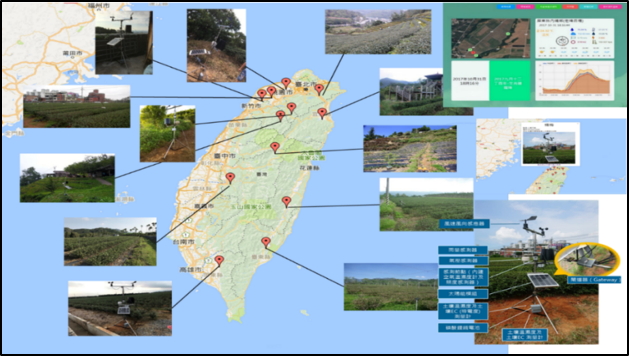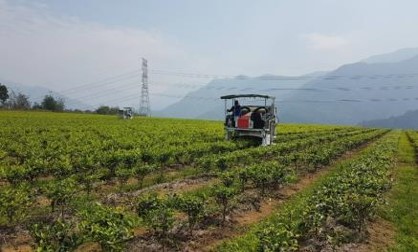According to a survey conducted by the Tea Research and Extension Station, Council of Agriculture, Executive Yuan (referred to as the Tea Research and Extension Station) in 2014, of all segments in tea production and cultivation process, the one with the most severe labor shortage is manual tea plucking (87%), followed by tea production (5%), making labor shortage a pressing issue in tea industry. In addition, the tea industry also needs to combat against climate change and other environmental changes because the timing of tea plucking affects the quality of tea. If we can have a good understanding of climate change conditions in the tea production and cultivation process, we can effectively predict and control the fresh tea leaf production period and perform precise management.
In response to the labor shortage and climate change problems, since 2017, the Tea Research and Extension Station has actively developed smart tea farm management technology and worked with Taiwan Tea Cooperation, the biggest tea company in Taiwan, to establish a demonstration field in the tea base in Laopi Farm (about 500 hectares) in Pingtung. The goal is to realize precise tea cultivation, including using AI to predict the best period for tea plucking and mechanically pluck tea leaves by self-propelled tea plucking machines to supplement human work force and improve the quality and yield of tea leaves.
 Figure 1 Micro-meteorological observation station and timely display system for tea farms
Figure 1 Micro-meteorological observation station and timely display system for tea farmsAs of 2018, the Tea Research and Extension Station had set up 26 micro weather stations in various tea farms in low, medium and high altitude areas through out Taiwan. In these micro weather stations, sensors and Internet of Things are applied to collect meteorological information and investigate the growth trend of tea trees for the establishment of a big data database. Through AI deep learning, a model that can predict tea production period and provide early warning has been established based on the tea production cycles in different tea cultivation areas (a production period is about 42 to 50 days). This model can instantly provide farmers with data on temperature, humidity, soil fertility and water content, as well as suggestions about irrigation, fertilization and tea plucking through mobile phones as opposed to experience-based judgment in the past. With the assistance of AI, farmers can be more precise at each stage of tea production and cultivation, including irrigation, fertilization, spraying and tea plucking, making the quality of the tea more consistent. With the right timing, the quality of the machine-plucked fresh tea leaves can be as good as that of the hand-picked one-tip two-leaf fresh tea leaves.
Taiwan imports about 30,000 tons of tea for commercial use every year. However, there are concerns about the pesticide residuals in the imported tea. To bridge the gap between supply and demand of commercial tea, it is inevitable for the tea industry to implement large scale cultivation and machine plucking in Taiwan. The cost of manual plucking is about NT$ 50 to 70 per 600 grams of tea leaves. Take Laopi Farm for example, Laopi Farm can produce 100 tons of fresh tea leaves a day, which requires 1,000 farmers to manually pluck the fresh tea leaves. The cost of manpower is quite considerable. A tea plucking machine can replace 300 to 400 farmers. After the Tea Research and Extension Station introduced the riding-type tea plucking machines, the problem of labor shortage was solved. The introduction of tea plucking machines not only saves the large amount of labor cost but also greatly improves the management efficiency of the tea farm so that people can enjoy high quality tea of domestic production.
 Figure 2 Operation of riding-type tea plucking machine
Figure 2 Operation of riding-type tea plucking machineThe scale of most tea farms in Taiwan are quite small. The current small-scale farming is not very efficient, and the quality of tea is inconsistent. The intelligent tea farm management technology developed by the Tea Research and Extension Station provides key parameters of successful tea production to contract farmers. The agricultural enterprise drives the surrounding satellite contract farmers to form a smart farmer alliance for �carrying out large-scale group intelligent production and management so that individual farmers can also produce high quality tea with consistency.